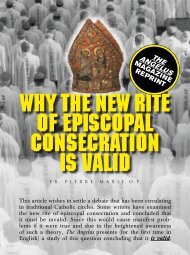Is Feeneyism Catholic? - Society of St. Pius X
Is Feeneyism Catholic? - Society of St. Pius X
Is Feeneyism Catholic? - Society of St. Pius X
Create successful ePaper yourself
Turn your PDF publications into a flip-book with our unique Google optimized e-Paper software.
66 IS F EENEYISM C ATHOLIC?<br />
tion in mind, let us consider <strong>of</strong> which desire <strong>St</strong>. Gregory speaks<br />
here.<br />
Those who “are not in a position to receive it” are for instance<br />
those who, as infants, do not have the use <strong>of</strong> reason: in this case,<br />
<strong>St</strong>. Gregory exhorts those who are responsible for them not to delay<br />
their baptism. Notice that <strong>St</strong>. Gregory exposes here the principle<br />
<strong>of</strong> limbo: these will be “neither glorified nor punished by the<br />
righteous Judge.” That only applies to those without the use <strong>of</strong><br />
reason. (Some followers <strong>of</strong> Fr. Feeney would like us to think that<br />
infants in limbo suffer like in hell).<br />
Others “are not in a position to receive it” but may have a<br />
“wish” for it, as in the case <strong>of</strong> “tyranny,” i.e., that they are under<br />
tyrannical authority preventing them from being baptized in spite<br />
<strong>of</strong> their wish. But what kind <strong>of</strong> wish is it? The key sentence is<br />
there: “If you judge the murderously disposed man by his will<br />
alone, apart from the act <strong>of</strong> murder, then you may reckon as baptized<br />
him who desired baptism apart from the reception <strong>of</strong> baptism.”<br />
Now, if it were a firm will and resolution, such a sentence is<br />
only true <strong>of</strong> the human judge, but not <strong>of</strong> God: “for man seeth<br />
those things that appear, but the Lord beholdeth the heart” (I Kg<br />
16:7); a human judge cannot condemn nor punish an interior sin<br />
nor reward an interior act <strong>of</strong> virtue, because he cannot see within<br />
the heart; hence the Church can never hold for certain that someone<br />
has baptism <strong>of</strong> desire. 97 But it is most sure that God, who sees<br />
the heart, does punish interior sins as the exterior: “But I say to<br />
you, that whosoever shall look on a woman to lust after her, hath<br />
already committed adultery with her in his heart” (Mt. 5:28).<br />
Given that murder is even worse than adultery, were <strong>St</strong>. Gregory<br />
speaking <strong>of</strong> such a real resolution and firm will, he could not say<br />
that “the murderously disposed man” would not be judged and<br />
condemned by God in case he is prevented from the exterior act<br />
<strong>of</strong> murder. Now, since God is more prompt to mercy than to punishment,<br />
and, as we have seen, He does punish sinful firm will<br />
and resolution even apart from the act, how much more does he<br />
reward righteous firm will and resolution even apart from the act,<br />
97 Baptism <strong>of</strong> blood is clearly exteriorly manifested, to give one’s life for Christ<br />
and the true Faith is even the greatest pr<strong>of</strong>ession <strong>of</strong> Faith! Hence the Church<br />
can canonize such persons, but never one with merely baptism <strong>of</strong> desire.











